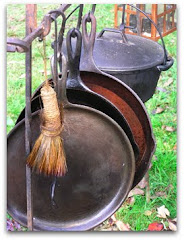I've been surprised to read over and again that cooking in cast iron is known to greatly increase our dietary source of iron by leaching small amounts of iron into the food we eat. People who are anemic, or have other iron deficiencies, may benefit from this effect, though those with excess iron issues (i.e., people with hemochromatosis) may suffer negative effects.
This finding seems to be especially true when cooking foods high in acid, such as tomato based sauces, and the frequent stirring of food may also increase the amount of iron in foods cooked in cast iron. As you might expect, foods that spend more time in the cast iron will lend more iron to the body (as opposed to foods that are quickly fried in a pan/skillet). Foods that are cooked in cast iron can often provide all of the iron that a body needs.
Extreme iron deficiency can cause anemia. Women are more prone to iron deficiency because of the loss of blood through menstruation. Because iron can also be lost through perspiration, athletes can also be subject to low iron. It is also known that the excessive consumption of tea or coffee can inhibit the absorption of iron by the body. I wonder what's considered excessive these days, what with a coffee shop on almost every corner - yikes! That might be a small exaggeration, but I imagine we probably consume more coffee and tea than ever before. Cooking with cast iron might just be the answer more than we know.
It should be noted that it is also possible to consume too much iron; toxicity levels begin at about 45 milligrams per day. In an average diet it is very unlikely that cooking with cast iron will bring a person to this level. Low iron is more likely to be a problem, and cooking with cast iron can be less expensive and more fun (at least more hunger satisfying!) than taking iron supplements. If you do use cast iron you should consult your doctor before taking other iron supplements.
Subscribe to:
Post Comments (Atom)

No comments:
Post a Comment